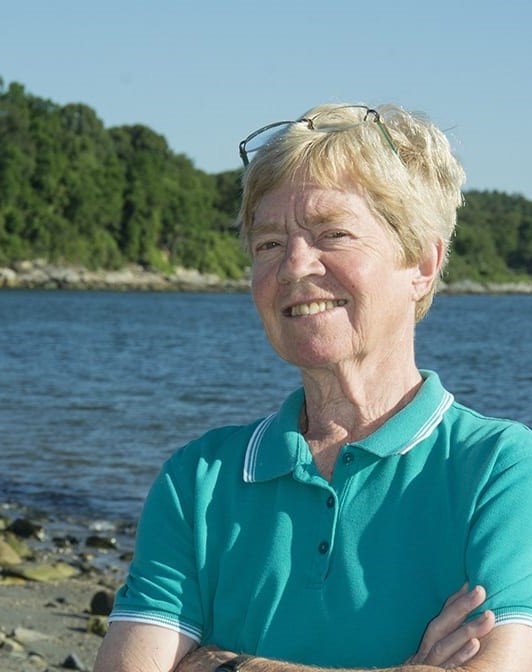
Dr. Candace A. Oviatt has, through teaching and mentoring and by her example, been responsible for significant scientific advances in our understanding of Rhode Island’s marine ecology as well as numerous contributions to the conservation of Rhode Island ecosystems. She is presented with the 2021 Rhode Island Natural History Survey Distinguished Naturalist Award.
Watch a video of the award event, held via Zoom, with remarks by Candace Oviatt.
Candace Oviatt has spent over 50 years researching the estuarine ecology of Narragansett Bay and is recognized as the leading expert in the Bay’s ecology as well as a world-renowned scientist. Her interest and keen ability to assess Rhode Island’s ecosystems holistically is perhaps best reflected in her seminal work with Dr. Scott Nixon in Bissel Cove. This study was among the first to develop a whole-system energy budget for salt marshes—and the first to contrast New England marshes with those from southern regions. Oviatt and Nixon measured all components of the ecosystem, from the standing crop of Spartina to the fish species that dominate the tidal pools, and everything in between. This work, published in Ecological Monographs, is considered a classic in the field and has been cited 432 times (estimated from Google Scholar). Her scientific publications are too numerous to list, but all take similar approaches of linking ecosystem components together to understand how systems function and respond to human impacts.
Candace Oviatt’s holistic approach to understanding marine ecosystems has been a cornerstone of her career, and the foundation to the science conducted at the Marine Ecosystems Research Laboratory (MERL). MERL was established at URI’s Graduate School of Oceanography in the early 1970s, with Oviatt serving as a key player from its inception. Over succeeding decades, she served as the MERL’s manager (1977-1984), associate director (1984-1994), and director (1994-2000). MERLs large, deep mesocosms and the research conducted in them fundamentally changed our understanding of how marine ecosystems function. They provided some of the most conclusive evidence of nitrogen-limitation in temperate estuaries at a time when there was still great debate about nitrogen vs. phosphorus limitation and linking increasing nutrient loads to numerous aspects of estuarine structure and function.
The impact of these early MERL studies cannot be overstated: they were revolutionary, among the first whole-system experiments in marine systems. These studies led communities to accept the role of nitrogen as the limiting nutrient in temperate estuaries and as a key driver of eutrophication. They still form the basic underpinning of our understanding of nutrients and eutrophication in coastal marine ecosystems today. With their experimental facilities, Oviatt and her colleagues designed three decades of experiments to determine how sewage alters estuarine systems, how estuaries filter and trap nutrients, and how grazing alters coastal primary production. This work has been instrumental in designing nutrient management plans for Narragansett Bay, and for estuarine systems throughout the United States and the world.
Candace Oviatt’s scientific impacts on Rhode Island’s natural history are also reflected in her years of teaching and mentoring students. She has advised 34 graduate students (16 Masters and 18 Ph.D.s) to date and is still advising. Further, she has served on over 121 graduate committees, highlighting how sought-after her expertise is. As former students of hers, we serve as a testament to how her vast knowledge and understanding has inspired professionals in a tremendous variety of scientific disciplines. She is a steady and strong advisor who demanded, and succeeded in getting the very best from us while remaining unfailingly supportive and available to anyone whenever needed.
Possibly less highlighted than her academic career, but at least as important, is Oviatt’s ability to convey her science to the general public, stakeholders, and managers. Such successful communication and engagement has had a monumental affect on how society views and preserves the Bay’s ecosystem. Oviatt’s research on how changes in climate—at local and ocean-basin scales—and wastewater treatment have influenced the Bay’s ecosystem has been a constant reference for state managers trying to balance initiatives for clean waters and prosperous ecosystems. The impacts of her research and outreach on science-informed management and preservation of Narragansett Bay will continue to have lasting, positive effects widely among non-academic Rhode Islanders.
It should also be noted that while Oviatt is a world-renowned marine ecologist, her passion for Nature does not stop with the ocean. Her hobbies center around enjoying the natural resources that Rhode Island supports: she is an avid recreational bird watcher, equestrian, hiker, and a fierce advocate for natural resource conservation. It is this naturalist passion that drives her to be an exceptional scientist and to inspire others to reach for similar heights.
Dr. Candace Oviatt’s contributions to the fields of Rhode Island ecology and natural history make her particularly deserving of the Rhode Island Natural History Survey’s Distinguished Naturalist Award. Her impacts on marine ecology, conservation, management, and education are well apparent and will have long-lasting impacts for Rhode Island and beyond.
Drs. M. Conor McManus, Robinson W. Fulweiler, and Jason S. Krumholz